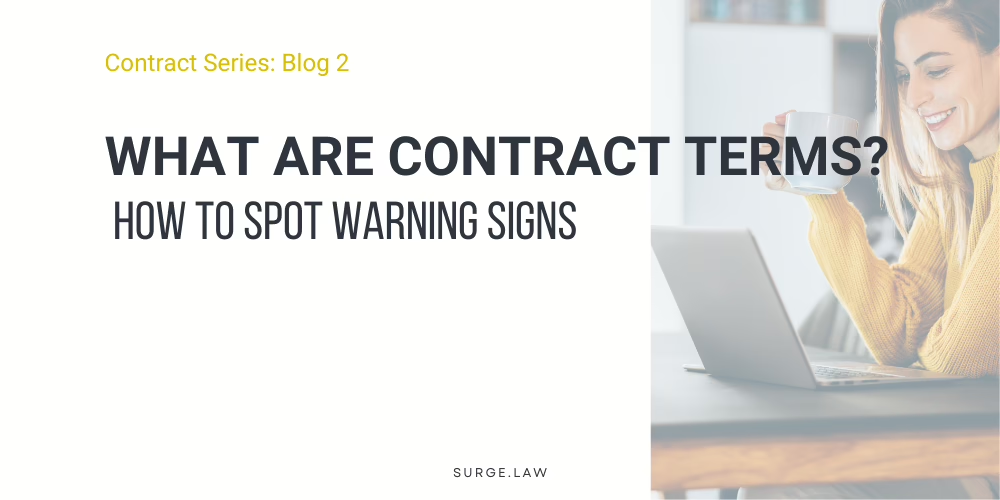What Are Contract Terms? How to Spot warning signs
The fine print can be more than you bargained for.
In 2010, a UK-based video game retailer, Gamestation, played a prank by sneaking a bizarre clause into their terms and conditions: customers unknowingly gave away their souls. While it was meant as a joke, it exposed an uncomfortable truth—most people don’t read or understand the terms of contracts they agree to. This is a reminder of how important it is to understand contract terms and protect yourself from unintended consequences.
Contract terms are the details that define your rights, responsibilities, and obligations. These terms are often what people negotiate the most because they shape how the agreement works in practice. Whether you’re selling a service, partnering with someone, or hiring an employee, knowing how to spot key contract terms can help protect your business from risk and position it for success.
What Makes Contract Terms So Important?
The written terms of a contract override any verbal promises or email discussions. Even if you agreed on something informally, the contract terms control the final deal. If you don’t understand what the terms say—or worse, if you don’t read them—you could find yourself stuck in an unfair agreement. That’s why it’s important to take a closer look at the fine print.
Some contract terms can shift risk onto you, while others make sure your business is protected. And all too often, poorly written terms limit the options of business owners. However, well-crafted contract terms can help you avoid disputes later and put standards in place to increase your business success. Know what to look for—and what to avoid. This makes all the difference.
Key Contract Terms to Pay Attention To
- Indemnify Clause and “Hold Harmless”
One of the most important areas to review is indemnification clauses. These terms decide who is responsible if something goes wrong, such as legal trouble. You’ll also want to keep an eye out for the phrase “hold harmless”, which works the same way. If the other party shifts responsibility to you, you could find yourself paying for mistakes that aren’t your fault.
- Exclusive or Perpetual Rights
Watch out for exclusive or perpetual rights in the terms. These can lock you into long-term commitments, like granting someone the forever right to use your work or limiting your ability to work with others. For example, a contract giving someone perpetual, exclusive rights to a logo means you’ll never be able to use it elsewhere again, even if you wanted to.
- Remedies Clause
Another section to check is the remedies clause. This part explains what can happen if the other party breaks the contract. It might promise only a refund, which could leave you without enough compensation for serious losses.
- Choice of Law Clause
Alongside remedies, the choice of law clause decides which state or country’s rules will apply if there’s a legal dispute, and where the case will need to be handled. If the contract says disputes will be settled in a distant state or country, it could make resolving issues costly and complicated.
- Long, Complex Paragraphs
Be especially cautious of long, complex paragraphs hidden deep in the contract. These sections often contain sneaky clauses that are easy to miss, buried in the middle of dense text. A quick scan of the first sentence won’t be enough.
Helpful Hint: If you find a confusing block of text, try entering it into a tool like ChatGPT for a quick summary—better yet, consult a lawyer.
When Contract Terms Work in Your Favor
Good contract terms can benefit your business just as much as bad ones can hurt it. For example, a sales contract might allow you to raise prices by a small amount each year, helping you stay ahead of inflation. Similarly, partnership agreements spell out how partners will share profits, manage responsibilities, and resolve disputes, preventing future misunderstandings.
Benefits of Terms in Specific Contracts
- Non-Compete Agreements – In employment contracts, if you choose to opt for using non-compete agreements, they are more likely to hold up in court if they include reasonable limits on time and geography.
- Non-Disclosure Agreements – Better yet are non-disclosure agreements (NDAs). These are powerful tools to protect your business’s valuable processes and information. If your NDA clearly outlines what happens when someone leaks your information, you’re more likely to get meaningful legal action when needed. Since courts can’t “un-leak” information, it’s essential that the consequences are laid out in your NDAs in advance.
Conclusion: Read the Terms, Protect Your Business
Contract terms shape the success of your agreements. Whether you’re working with a client, partner, or employee, it’s essential to understand what the fine print says and how it impacts your business. Remember, what’s written in the contract will control the outcome—not the promises made in casual conversations or emails. Keep an eye out for indemnification clauses, exclusive rights, and remedies, and be cautious with dense paragraphs that hide sneaky clauses. If something feels unclear or unfair, don’t hesitate to negotiate better terms.
Learn more about contracts: Now that you know how important contract terms are, it’s time to explore what makes them legally binding. The next blog in this 6-part series on business contracts is What a Contract Needs to be Legally Binding. In it, we break down the key elements every contract needs. These contract tips will help strengthen your agreements and your business.
If you want to learn more about business contracts, sign up below. You’ll get the 6-part blog series delivered to your email inbox free.


